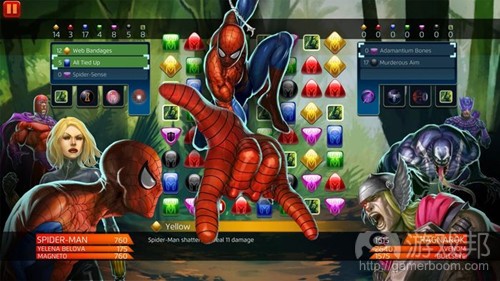Philip Kollar谈如何接受现行游戏中的F2P模式
作者:Philip Kollar
上周我玩了一些不同的游戏。我完成了这一季的《行尸走肉》。并没有很好。我同样也尝试了《恶名昭彰:破晓》。这款游戏倒是很棒。
但我的大多数空闲时间都是花在一些意外的内容:基于手机且侧重微交易的免费游戏。出乎意料的是我真的玩得很开心。
训练场地
当我发现自己虽然带了Vita但却找不到任何有趣且特别的游戏内容时,我正在明尼苏达州的乡下度假。我想要玩一些低强度,同时还能让我专注于与家庭相处的游戏。
我在iPad上随意浏览着Twitter,突然意识到自己拥有完美的设备能够推动这样的体验。我打开App Store并开始搜索受欢迎的游戏。我认为这将是一个很棒的学习经验—-能让自己接触1周当前iOS上最热门的内容。一旦我回到家里,我将不再回到这类游戏中。
我下载的第一款游戏是发行不久的《WWE Supercard》。我喜欢摔跤和《炉石传说》。所以我会喜欢这款游戏吧?
最终证明,《Supercard》与《炉石传说》是截然不同的游戏。比起进入一款带有30张纸牌的桥牌的游戏,你创造了一支只有5个人的团队。同时你也不是在对抗活生生的敌人;相反地,你是在与其他玩家搜创造的桥牌进行抗衡,但是你会根据AI选择如何使用纸牌。
《Supercard》的简单性适合较短且让人满足的游戏过程。我在2分钟内便完成了整个比赛。每次比赛至少能够带给我1张纸牌作为奖励,不管我的输赢。我可以将纸牌储存在主名册中,对它们进行升级使其变得更加强大。
这个简单的进程系统非常强大,这是创造一款优秀的免费游戏的关键。
魔术
在玩了几个小时的《Supercard》后,我决定回到App Store看看还有没有其它可玩的游戏。最先吸引我的眼球的游戏便是《Spellfall》。我收到了一些关于这款游戏的新闻稿,我还是很喜欢三消游戏的。结合RPG游戏玩法(游戏邦注:就像在《Puzzle Quest》那样)意味着这款游戏至少能够在一定时间内吸引我的注意。
你将操控一个年轻的巫师穿越一片满是煤泥,蜘蛛和其它怪物的荒地。你将通过匹配同样颜色的宝石而投射咒语,但这与常见的“宝石迷阵”规则具有一个较小但却很重要的区别:你可以在整体游戏面板上的任何位置交换两个宝石。它们不需要是相邻的。
考虑到自由,《Spellfall》并不是关于清空面板去寻找任何可能的搭配,而是关于设置并部署大规模的连接。在我所经历的第一张世界地图上,推动更大规模的组合比单一的匹配更重要。
机智的游戏将获得更多货币奖励,而玩家可以用这些货币购买更好的武器,盔甲和咒语。虽然这属于RPG 101,但是它却处理得非常好。
我喜欢《Spellfall》可爱的卡通世界以及巧妙的三消游戏玩法。但在投入半个小时于游戏中后我发现自己不得不接受一个让人受挫的免费游戏核心:超时设定。
休息
如果你曾经花时间去尝试像《FarmVille》这样受欢迎的社交游戏,你可能会非常熟悉这些游戏将时间作为一种资源的方法。你想要创建一个谷仓?这可能需要花费50个金币以及6个小时。6个小时是真实的时间。
在像《Spellfall》的游戏中,其游戏机制是围绕着角色的生命值。在一些战斗的过程中,我的生命值降到只剩一半,然后又降到只剩1/4。我进入了一个危险的区域。我拥有2个选择:使用辛苦获得的金币去换取治愈道具而不受前进需要的装备升级道具,或者我可以在角色治愈前离开游戏20分钟。
我讨厌这样的机制。我非常生气。愤怒地关掉了游戏,并打开了Twitter应用备份。我跟家人说:“这简直是胡说八道。”
当然了,我理解为何会出现这样的机制。其目的便是强迫玩家做出一个艰难的选择:以花金币为代价继续游戏,当然了,玩家可以通过使用真钱或花半个小时做某事去换取金币。但我已经早就决定要花多少钱于游戏中—-5至10美元,不能再多了。最终我决定跳过计时器且不浪费半分钱。
我怀疑这对于大多数在自己的平板电脑或手机上玩游戏的人来说并不是个好交易。但作为伴随着游戏长大的人,也就是拥有25年玩游戏经验并会在愿意的时候停止游戏的我来说,这是难以理解的设置,让我很生气。游戏拿走了玩家对于节奏的控制权,并将这当成是一种赚钱的方式。
这是我在这个时候所感受到的。这也是我所害怕承认的:在花了2周时间玩这些游戏后,我竟然开始接受暂时休息机制了。
接受变化
我所选择的第3款游戏可以说是转折点般的存在。我再一次回到了App Store,希望找到一款能够转移我对《Spellfall》的愤怒的游戏。但我仍然想要玩三消游戏玩法。我很喜欢早前的《Puzzle Quest》。
于是我便决定给《Marvel Puzzle Quest》一个机会,因为它就像是之前2款游戏的结合。这款游戏的核心玩法是抗击其他超级英雄和恶棍的三消战斗。但为了使你的英雄变得更加强大,你需要收集“covers”以提供给他们全新的能量和特殊的货币(名为Iso-8),从而让他们能够获得升级。
《Marvel Puzzle Quest》同样也使用了基于时间的治愈机制,但因为它是分别用于每个角色,所以更加有效。一旦我创造了一个可供交换的英雄花名册,我便能够在其中一个英雄治愈期间使用其他英雄。
什么是有趣的?尽管我意识到可以更巧妙地使用更大的花名册去缩小休息时间,但我最终却不想这么做。相反地,当我最喜欢的英雄需要休息时,我会选择关闭游戏并专注于与家人聊天,或者读书,再或者回到《Superfall》中继续前进。
很多人着眼于免费游戏机制并认为它们带有剥削性质。即尝试着去压榨那些没有耐性的玩家的钱包。我敢保证它们真的成功做到了这点。
但这里也存在另一个角度:这些机制同样也推动着游戏去吸引那些忙碌的成人的注意。我可以在工作之余花10或20分钟于游戏中,然后在角色治愈期间回到工作中。我可以在吃晚饭前以及儿子洗澡的时候快速进行几次匹配。我可以在自己忙碌的一天里随时体验这些游戏,而无需安排好几个小时沉浸于其中。
《Spellfall》和《Marvel Puzzle Quest(甚至是《WWE Supercard》)之所以能够吸引我的注意的一个原因便是它们虽然很简单,但却仍具有合理的策略,并且让我能够通过完善自己的技能而获得满足感。
撇开那些要钱的方法,我发现自己已经深深爱上了这些游戏机制。当然了,对于我来说,免费游戏并不可能完全取代完整的大型游戏。就像《Spellfall》并非《龙腾世纪:审判》的替身。但作为一种辅助体验它们真的很棒,能够让我在没有多少时间的时候快速体验到游戏所带来的乐趣。
当我不再因为未能获得自己想要的而是玩着设计师所设计的游戏感到不安时,我真的变得越来越开心。对的,我不再害怕去接受这样的游戏了。
(本文为游戏邦/gamerboom.com编译,拒绝任何不保留版权的转功,如需转载请联系:游戏邦)
Learning to love free-to-play
by Philip Kollar
I played a few different games last week. I finished this year’s season of The Walking Dead. It wasn’t great. I also checked out Infamous: First Light. That one is pretty good.
But the vast majority of my free time gaming has gone to something unexpected: mobile-centered, microtransaction-heavy free-to-play games. I’m also having a blast, against all expectations.
TRAINING GROUND
I was on vacation in rural Minnesota when I realized that I had brought my Vita but didn’t have anything I was particularly excited to play. I wanted something low-impact to play in the background while focusing on spending time with the family.
I was mindlessly browsing Twitter on my iPad when I realized I had the perfect device to facilitate that experience. I went on to the App Store and started flipping through popular games, with a little hesitation. I figured this would be a good learning experience — a chance to expose myself to whatever’s currently hot on iOS for a week. Once I went home I would never have to return to this style of game.
My first download was the recently-released WWE Supercard. I love wrestling and I love Hearthstone. So I should love this, right?
As it turns out, Supercard is a very different game from Hearthstone. Rather than going into a match with a deck of 30 cards, you create a team of only five. You’re also not fighting against live opponents; rather, you’re matched up against decks created by other players, but with the AI choosing how the cards are actually played.
The simplicity of Supercard lent itself to short, satisfying sessions. I blasted through full matches in two minutes or less by tapping past the silly animations. Each match rewarded me with at least one card whether I won or lost. Cards that I didn’t want to hold onto could be “fed” into my main roster to level them up and make them more powerful.
That simple progression system is incredibly powerful and, I would soon discover, the key to making a good free-to-play game.
MAGIC TRICKS
After a couple of hours with Supercard, I decided to venture back to the App Store and see what else was available. The first game to catch my eye this time was Spellfall. I had received some press releases about this one, and I have a soft spot for match-three games. Combining that with RPG gameplay (as in Puzzle Quest) meant there was a good chance it would pull me in for at least a little while.
You play a young wizard journeying through a desolate land full of slimes, spiders and other monsters. You cast spells by matching colored gems, but there’s a tiny yet important distinction to be made from the regular Bejeweled formula: You can swap two gems from any location on the whole board. They don’t need to be right next to each other.
Given that freedom, Spellfall became less about scouring the board to find any possible match and more about setting up and deploying massive chains. The further in the first overworld map that I progressed, the more important it became to always be pushing for giant combos rather than single matches.
Smart play is awarded with more coins, which can be used to buy better weapons, armor and spells. It’s RPG 101, but it’s all handled very well.
I enjoyed Spellfall’s cute cartoon world and smart twist on match-three gameplay. But about a half an hour into it I discovered a frustrating free-to-play mainstay that I would need to learn to accept: timeouts.
TAKE A BREAK
If you’ve ever taken a second to try out popular social games like, say, Farmville, you might be familiar with the way these games wield time itself as a resource. You want to build a barn? It will cost 50 gold and take six hours. That’s six hours of real time.
In games like Spellfall, this mechanic is expanded to encompass the character’s health. Over the course of several battles, my health was whittled down to half, then one-fourth. I was getting into dangerous territory. I had two options: Spend my hard-earned gold on healing rather than the necessary equipment upgrades I needed to progress, or simply leave the game for 20 minutes while my character heals up, hitpoint by hitpoint.
I hated this. I was furious. I closed the game in disgust, opened the Twitter app back up and raged. I turned to an oblivious family member: “This is bullshit.”
I understood where it came from, of course. The idea is to force players to make a tough choice: Keep playing at the cost of gold, which can, of course, also be purchased with real money, or do something else for half an hour. But I had decided early into this experiment that I would only spend as much in these games as I would be willing to buy them for — five or ten dollars, maybe, but nothing more. I was determined to not waste money just to skip timers.
I suspect this isn’t as big of a deal for most people playing games on their tablet or phone. But as someone who grew up playing games, who has 25 years of experience sitting down to play a game and stopping when I want, this was aggravating and impossible to comprehend. It’s not what I was comfortable with, and certainly not what I wanted. Control of your pacing is taken away, and used as a way to make money.
That’s how I felt in that moment. Here’s something I’m kind of scared to admit: After two weeks of playing these games… I’m kind of okay with the timeout mechanic.
EMBRACING THE CHANGE
A third game was the turning point for me. I had, once again, returned to the App Store hoping to find something to wash away my anger at Spellfall. But I still had the thirst for match-three gameplay. I had loved the original Puzzle Quest back in the day, and superhero comics are my jam.
I decided to throw caution to the wind and give Marvel Puzzle Quest a try.
It was serendipity that Marvel Puzzle Quest was the third game I tried, because it’s strangely kind of a mix of the first two. The core gameplay is match-three battling against other superheroes and villains. But in order to improve your heroes, you need to collect “covers” that provide them new powers as well as a special currency (called Iso-8) to level them up.
Marvel Puzzle Quest also employs a time-based healing mechanic, but since it’s applied to each character individually, it’s a little more workable. Once I built up a small roster of heroes to swap between, I was able to keep fighting with one group while another healed, switching characters out as necessary.
The funny thing? While I realized I could use the bigger roster strategically to minimize downtime…I ended up not really wanting to. Instead, when my favorite heroes need to rest, I’d close the game and focus on chatting with the family. Or reading a book. Or, heck, returning to Spellfall and making a little more progress there.
A lot of people look at free-to-play mechanics and, understandably, interpret them as exploitative. It’s in place to try to squeeze cash out of impatient players with money to burn. I’m sure it accomplishes that.
Here’s another angle, though: Those mechanics also make these games something specially designed to work for adults with busy lives. I can play 10 or 20 minutes on a break from work, and then be done, safe in the knowledge that my characters are healing up so I can keep using them later. I can do a couple quick matches before dinner and still be free to help out with my son’s bath time. I can casually slot these games into my busy-as-hell day without feeling like I need to schedule out hours of free time to get sucked in.
Part of the reason Spellfall and Marvel Puzzle Quest (and even WWE Supercard to a lesser degree) have kept me invested is because they’re simple, sure, but there is legitimate strategy and a sense of satisfaction to improving my skills.
Disconnected to their methods of asking for money, though, I’ve actually found myself falling in love with the mechanics. Free-to-play games aren’t likely to replace full-sized games for me any time soon, if ever. Spellfall isn’t a stand-in for Dragon Age: Inquisition. But they’re perfect as a side experience than can give me a quick hit of what I love about gaming during days when I otherwise just wouldn’t have the time.
I became much happier once I stopped getting upset at not getting what I wanted and instead played the games as they were designed. I’m no longer scared to embrace that.(source:polygon)









































 闽公网安备35020302001549号
闽公网安备35020302001549号